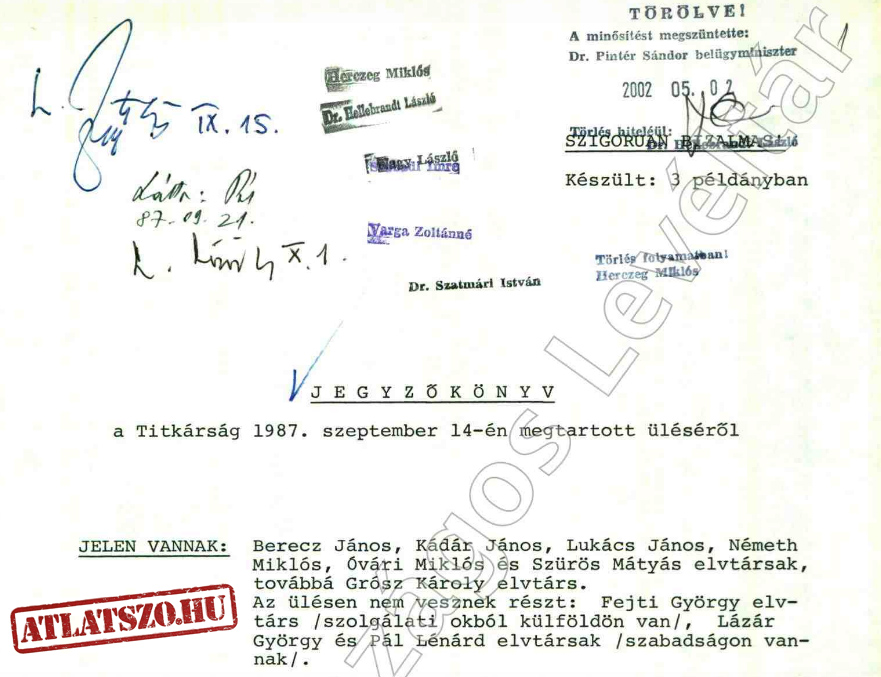The https://english.atlatszo.hu use cookies to track and profile customers such as action tags and pixel tracking on our website to assist our marketing. On our website we use technical, analytical, marketing and preference cookies. These are necessary for our site to work properly and to give us inforamation about how our site is used. See Cookies Policy
Missing treasure: A tale of socialists and gold
In the twilight of socialism in Hungary, the government of the day received an unusual donation – 17 kilos of gold. The value of the gold is immense, and over the decades many different groups have laid claim to it. And yet, after multiple twists and turns, which can be partially reconstructed from the available records, the 4,500 coins have disappeared.
“Paris, June 24, 1987 – the French-Israeli-Hungarian citizen André Z. Hornstein gave 4,500 gold coins to MSZMP at the Hungarian Embassy.” This is the first recorded entry in the mysterious story of how gold treasure came into the possession of MSZMP, the Hungarian socialist and labor party, which controlled the single-party socialist regime until its end in 1989.

The decades old story was disputed in late 2014 by historian Krisztián Ungváry, who has explored the struggles between the various political factions for ownership of the gold, and has looked into any clues as to where the gold ended up.
MSZMP had already split in 1989, as a precursor to the democratic transition after the end of the Soviet occupation of Hungary. The staunch socialists left the party, leaving the moderate left wing politicians to form MSZP. And MSZP went on to win three elections during the past two and a half decades of democracy and is still a parliamentary political group, even though support for it has recently declined significantly. Munkáspárt, the socialist worker party, continues to exist under a different name but still led by its unrelenting leader Gyula Thürmer. Thürmer pushes on, despite never having set foot in a democratically elected parliament and consistently attracting around 1%-2% of votes when elections come around.
At the time of the split, the sides were in dispute about who was entitled to the gold.
Available records show Hornstein intended the gold to be deposited at the National Bank of Hungary, to be used by MSZMP upon his death. He did not specify how he came into possession of the coins. Following the split in the party, the confusion about who is now legally entitled to the coins was inevitable, especially given that Hornstein’s directives couldn’t possibly have anticipated the split.
The confusion escalated in the early nineties with the entire country and its political establishment in turmoil. Thürmer’s own accounts, published in his memoirs, as well as his remarks made to Atlatszo.hu, show that the dismantling of the previous system brought the secret to light, and suddenly many more people on the left knew about the existence of the gold. The MSZP party thought Thürmer’s Munkáspárt had it, and offered $20,000. What they didn’t know, as Thürmer explained, was that the keys to the treasury had been lost, and there was therefore no access nor any reliable information about the location of the gold.
Unfortunately, the story has no reassuring conclusion. The central bank gave contradictory information when approached by Thürmer, at one point stating that it no longer possessed the coins, and at another time that MSZP is the legal successor to the state party, and hence Munkáspárt is not entitled to further information.
Thürmer also received unconfirmed news that Hornstein had reclaimed the gold. It seems that he was entitled to do so based on his original instructions, since his intention was that the money go to the MSZMP of the socialist era and not to its “descendants.”
The latest development in the story, as set out in Ungváry’s article published in the political weekly Figyelő, is that MSZP instructed the central bank to transfer the gold to a lawyer, András Éliás in 1998. The historian reached out to László Puch, MSZP’s treasurer, who said his party decided it had no right to dispose of the wealth valued at near HUF 160 million (€500,000) based on current prices, and had instructed Éliás to liquidate it.
There is no further information about the whereabouts of the gold or the price that may have been paid for it.
The original article in Hungarian was published on 16th January 2015.

